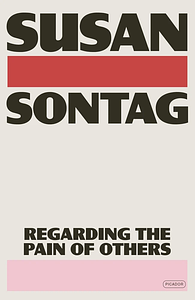You need to sign in or sign up before continuing.
Take a photo of a barcode or cover
challenging
informative
reflective
medium-paced
In this short work, Sontag takes on the earlier critiques she had of photography. We are surrounded by images of violence. We often use those images badly (to nurse the rage that spurs other waves of violence). Or we get a perverse thrill out of the shock. Or we don't feel shocked at all, growing numb and losing our compassion. (For instance: the cover of this book is a horrific drawing of someone sitting back and admiring a hung person. When Easton saw it lying around and reacted with shock, I realized I had forgotten that's what the cover showed.) Above all: Sontag reminds us that an image doesn't convey a simple message. It's not in anyone's control.
Reading this, I thought of the increasing visibility of police brutality and racist attacks against Black people. The push to "release the video," make it go viral, insist that mass society witness or confront these violent events. The push back to stop flooding every forum with retraumatizing footage of Black people suffering.
My parsing of Sontag is that she acknowledges all these problems and shortcomings, but still believes images of human trauma should have a place in our culture, if only to remind us that this is also who we are as a species.
Reading this, I thought of the increasing visibility of police brutality and racist attacks against Black people. The push to "release the video," make it go viral, insist that mass society witness or confront these violent events. The push back to stop flooding every forum with retraumatizing footage of Black people suffering.
My parsing of Sontag is that she acknowledges all these problems and shortcomings, but still believes images of human trauma should have a place in our culture, if only to remind us that this is also who we are as a species.
Someone who is perennially surprised that depravity exists, who continues to feel disillusioned (even incredulous) when confronted with evidence of what humans are capable of inflicting in the way of gruesome, hands-on cruelties upon other humans, has reached moral or psychological adulthood.
No one after a certain age has the right to this kind of innocence, of superficiality, to this degree of ignorance, of amnesia.
Thought provoking commentary. Love when uni readings are interesting!
challenging
dark
informative
reflective
sad
emotional
sad
tense
fast-paced
challenging
informative
reflective
medium-paced
I'm about to word vomit.
What does it mean to look at a photograph of another's suffering? Does the voyeuristic aspect outweigh any benefit? While I disagreed with Sontag at times, in the end she holds up a dichotomy I found interesting and nuanced: the photographs as necessary vs the photographs as entirely imperfect. She finishes the book with a point I agree with: that photographs and even witnessing without the medium of photography in the way will never take the place of actual experience. I'm still thinking about her other point, that the pictures are actually necessary, because I feel like her evidence for that was less solid. She writes that it is human nature to turn away from these kinds of photos, and that that's not bad necessarily—but then what is the point of the photos? It gives an imperfect view of suffering; is it a necessary view, anyway? She says that photos should provide a starting point for action, but do photographs actually spur action to the point that the voyeurism is validated? She also brings up the fact that this idea that reality has been subsumed by media and photography is an elite opinion focused only on the first world. I wonder what she would say now if she were alive in 2023 about this. I also really would love an updated Susan Sontag essay on cameraphones. Obviously this will never happen :( I need to reread already, and I just finished this book.
I want to find everything else she's ever written and read it. I'm kind of late to the party but whatever.
What does it mean to look at a photograph of another's suffering? Does the voyeuristic aspect outweigh any benefit? While I disagreed with Sontag at times, in the end she holds up a dichotomy I found interesting and nuanced: the photographs as necessary vs the photographs as entirely imperfect. She finishes the book with a point I agree with: that photographs and even witnessing without the medium of photography in the way will never take the place of actual experience. I'm still thinking about her other point, that the pictures are actually necessary, because I feel like her evidence for that was less solid. She writes that it is human nature to turn away from these kinds of photos, and that that's not bad necessarily—but then what is the point of the photos? It gives an imperfect view of suffering; is it a necessary view, anyway? She says that photos should provide a starting point for action, but do photographs actually spur action to the point that the voyeurism is validated? She also brings up the fact that this idea that reality has been subsumed by media and photography is an elite opinion focused only on the first world. I wonder what she would say now if she were alive in 2023 about this. I also really would love an updated Susan Sontag essay on cameraphones. Obviously this will never happen :( I need to reread already, and I just finished this book.
I want to find everything else she's ever written and read it. I'm kind of late to the party but whatever.
informative
reflective
medium-paced
heel heel interessant!!! maar ook een beetje chaotisch!!!!!




